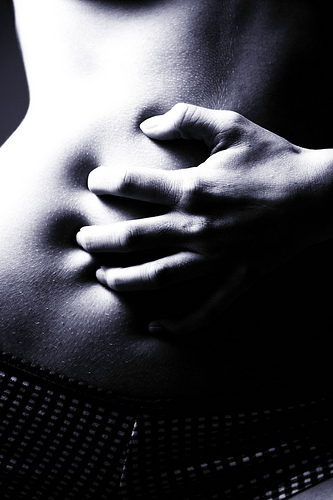Menorrhagia is heavy menstrual bleeding. Often times throughout a woman's life she will experience a heavy flow as compared to what she considers her normal flow, but this does not necessarily mean she is experiencing Menorrhagia. Often times stress, anxiety, and emotional turmoil are the cause for an unusual heavy flow that does not continue on a monthly basis. Women finding themselves in need of help for Menorrhagia will find they need to change their tampon or pad more often than every one to two hours and have a period that lasts more than seven days. Menorrhagia is when a woman looses about 5 1/2 tablespoons or more of blood during her menstrual cycle, over come with tiredness, fatigue or shortness of breath (symptoms of anemia), and the menstrual flow has blood clots.
So what are the causes of Menorrhagia? For some cases there is no specific cause but for some women causes of heavy bleeding could be:
- Hormonal imbalance
- Dysfunction of the ovaries
- Polyps
- Uterine fibroids
- Adenomyosis
- Pregnancy complications
- Inherited bleeding disorders
- Intrauterine device (IUD)
- Cancer
It is very important that women with excessive heavy bleeding, as described above visit their doctor in order to gain treatment for Menorrhagia and also to get treatment for the cause if there is one.
The treatment you receive will depend on the following information:
The treatment you receive will depend on the following information:
- Your overall health and medical history
- The cause and severity of the condition
- Your tolerance for specific medications, procedures or therapies
- The likelihood that your periods will become less heavy before long
- Your future childbearing plans
- Effects of the condition on your lifestyle
- Your opinion or personal preference
Nowadays there are many successful treatments for those needing help for Menorrhagia.
- Iron Supplements
- Birth control pill / oral contraceptive
- Nonsteroidal anti-inflammatory drugs (NSAIDs): These are ibuprofen, Advil, Motrin, etc
- Oral progesterone which is taken 10 days of each cycle and can help correct hormonal .coimbalance, which then reduces Menorrhagia.
- The hormonal IUD (Mirena) - intrauterine device that releases a type of progestin called Levonorgestrel, which makes the uterine lining thin and decreases menstrual blood flow and cramping.
- If a woman has menorrhagia from taking hormone medication, your doctor may be able to treat the condition by amending or halting your medication.
MayoClinic. com lists the following as surgical procedures toward help for menorrhagia, when drug treatments do not work.
- Dilation and curettage (D and C).
In this procedure, your doctor opens (dilates) your cervix and then scrapes or suctions tissue from the lining of your uterus to reduce menstrual bleeding. Although this procedure is common and often treats menorrhagia successfully, you may need additional D and C procedures if menorrhagia recurs. - Operative hysteroscopy.
This procedure uses a tiny tube with a light (hysteroscope) to view your uterine cavity and can aid in the surgical removal of a polyp that may be causing excessive menstrual bleeding. - Endometrial ablation.
Using a variety of techniques, your doctor permanently destroys the entire lining of your uterus (endometrium). After endometrial ablation, most women have little or no menstrual flow. Endometrial ablation reduces your ability to become pregnant. - Endometrial resection.
This surgical procedure uses an electrosurgical wire loop to remove the lining of the uterus. Both endometrial ablation and endometrial resection benefit women who have very heavy menstrual bleeding. Like endometrial ablation, this procedure reduces your ability to become pregnant. - Hysterectomy.
Surgical removal of the uterus and cervix is a permanent procedure that causes sterility and cessation of menstrual periods. Hysterectomy is performed under anesthesia and requires hospitalization. Additional removal of the ovaries (bilateral oophorectomy) may cause premature menopause in younger women.
With the exception of a hysterectomy, these procedures are usually done on an outpatient basis.
On the lighter side of things if you are woman who has heavy bleeding but do not meet the signs of menorrhagia there are things you can do to help your situation on your own.
- Include iron rich foods in your diet such as leafy greens or take iron supplements.
- Get regular exercise. Include Yoga Asanas specifically aimed at helping hormonal imbalance.
If your menses is heavy and unusually long lasting but thin, not clotty, your menorrhagia might be caused by a vitamin K deficiency. Vitamin K plays an important role in maintaining healthy blood clotting function, and heavy or long lasting but thin periods can be caused by poor blood clotting.
Always consult a doctor before increasing your consumption of vitamin K if you have;
- a personal or family history of blood clots, stroke, pulmonary embolism, or similar conditions, or
- if you are on any blood thinning medications.
It is easy to overdose on vitamin K if using supplements. Do not take vitamin K supplements except in cases of severe deficiency. Rather, get Vitamin K into your diet by consuming foods such as Romaine Lettuce, Spinach, Kale, Collard Greens, and Brussels Sprouts have the highest amount of vitamin K, on the lower scale is foods like, Broccoli, Spring Onions, raw parsley and Asparagus. Healthy acidophilus bacteria, which is found in yogurt, kefir, and similar dairy products containing live cultures, actually make the body produce vitamin K.
There are also vitamins and medicines that can kill off vitamin K.
- A high intake of Vitamin E and calcium in supplement form.
- Antibiotics which kill off healthy intestinal bacteria known as acidophilus, which in turn reduces the production of vitamin K. To avoid this, whenever you are taking an antibiotic take Probiotic Acidophilus tablets. These are also safe for children to take when they are on antibiotics. Follow the instructions on the bottle.
Help for menorrhagia is widely available and has high success rates but the treatment will depend on several pieces of information obtained by your doctor so it is very important that if you meet the criteria for menorrhagia you see your doctor in order to get the problem under control and rule out any underlying factors that could be the cause. If you are woman who has heavy bleeding but no clots and you don't soak a tampon or pad every 1-2 hours, then it is possible that you can use other methods in which to treat your heavy flow, such as a more iron and vitamin K rich diet and regular exercise.
Related Links
Natural Remedies for Painful Periods




















































Nice post..
ReplyDeleteGeneric Viagra, Kamagra Online, Generic Levitra